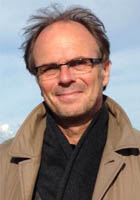Jürgen Nendza
Jürgen Nendza Poems
I
Pliable. The card thistle patrols the side of the path,
but is unable to tease open the material,
...
THE TREMBLING OF YOUR LIPS under language's
wakefulness: winged broom, herdsman's gaze
grow out of the land at the horizon. An open
...
ON SOME DAYS it appears
like happiness, the shadow
that wanders through the room
...
I
Eyelashes rustle, your look drifts beneath
thin ice. Daylight crouches above us.
...
Jürgen Nendza Biography
Jürgen Nendza ( 28 July 1957 in Essen ) is a German writer. After completing his high school diploma, Jürgen Nendza completed a study of German philology and philosophy , which he completed in 1991 with a doctorate at the RWTH Aachen University. He writes lyric , prose , radio plays , radio features and funk counts for children and is a member of the PEN Center Germany. In 1992 he made his debut with the poetry Glaszeit . Poems, essays and features have been in numerous anthologies and periodicals published. In 2005, Nendza and Eduard Hoffmann gave up the book, forbidden and celebrated. The poetry of Nendza goes beyond pure naturalism. At the same time, his poems contain human perceptions, sensations and memories that are woven into the natural interior. The Süddeutsche Zeitung counts Nendza "among the most interesting lyricists of his generation." Jürgen Nendza lives in Aachen . He also works as a teacher at a grammar school. His subjects are philosophy and literature.)
The Best Poem Of Jürgen Nendza
„...say the aerial roots" *
I
Perhaps
it´s the trembling
we begin and end with,
while the eyes suckle the sky
to the rhythm of a language
without any personal possessives:
copper, cinnamon, a turquoise-coloured
flyweight, say the aerial roots,
and we atomize with the hummingbird's
fan of light in non-stop flight, jetlag:
three grammes of flight tones and ecstasy,
variations in Calliope's voice.
And we remain standing
in the air, in a loop without
a dead turning point, while
beneath us the landscape
marches on.
II
Your eyebrow's
a questionnaire, in your eyes
the glow-worm's conversation:
say, do we grow another skin,
when you look at me like that
and we begin
to expand, to double:
mot mot, the pinions
of paradise, red red
the flowers of the flamboyant,
and the glow-worms ask:
is the hummingbird a metaphor
for a swarm of fish circling
around themselves, glittering
in colourful sleep, a lighting up
of the tints beneath our eyelids,
when speaking we
rotate: come come,
everyone lies alone
in his recovery room,
halved.
III
The heat
a huge hand
baked from light. We
drink coconut water, hear
the thirst that is slaked
along the welded joints
of our bodies: one's own
name splits up
beneath the aerial roots,
is a divided word
like copper or cinnamon,
without any personal possessives,
and a vibrating
at the root of the tongue
in the rotation
of the wings. Your lips
are singing bowls
at whose edges visible
light vanishes,
when only time
travels with us.
IV
The rain
ties its strings
to a beating wall:
a grey continuous tone
lies over us, the green,
the things: a skin
beneath which we lose our way.
Stunned as though
overwhelming loneliness
had opened its sluicegates,
our breath folds up
what light is left like a tablecloth:
we begin from memory
to accompany ourselves
while we talk of the
non-stop flight, search for
an explainable sequence, a handrail
into the dark and no one
with naked eye
recognises love.
V
Terracotta tile,
the print of your wet foot.
The present is vaporized
in this building of heat
and rain: fine air passages
lead to the tourqoise-coloured
flyweight, through the chambers
of the bones, when the trembling
feeds us beyond the light barriers.
Then let's talk about the hummingbird,
which has been said already
a thousand times, about the table,
which has been said already
a thousand times, about a thousand times:
never do we have enough hands
to grasp ourselves.
VI
The evening
gathers itself in
the rain tree. Yellow between
pairs of leaves
the queen of the night
lures like a deserted
feeling, which discovers us
when sleep speaks us:
turning over we've spread
the sheet and ourselves.
Contact sleep is how we attempt
the touch of wings, feathered
with the radius of distance,
until by daylight we grow
tired under the weight
of separated
bodies.
VII
The staccato of deadlines
is a buzzing flight:
a thousand times our eyes suckle
the sky, we throw out
aerial roots searching for
deep warmth with a chorus
made up of speech and the silence
at the end of the scale
of visible light. A thousand times
clouds sweep across
everything, death watches us
in the mirror
and still each time
your breath curves
beyond this image,
your breast draws
bow, brow and bay:
come come
says the trembling,
let's balance
on this frequency
where we end.
VIII
Perhaps
one day we shall take pleasure
in the way the ants step
out from under our shadow.
One day, when your circulation
fails, your skin
will be as white
as the paper on which
I am writing, on which you
read, white and still:
it will be a cast off
wedding dress always already
inscribed by you
and when the turning point
has died, the sheet pauses
in a final turning over
beneath a landscape
made of dreams
that floats over us,
then I'll ask you:
how long an exposure
does happiness need before
our eyes close us.
Translated by Richard Martin
